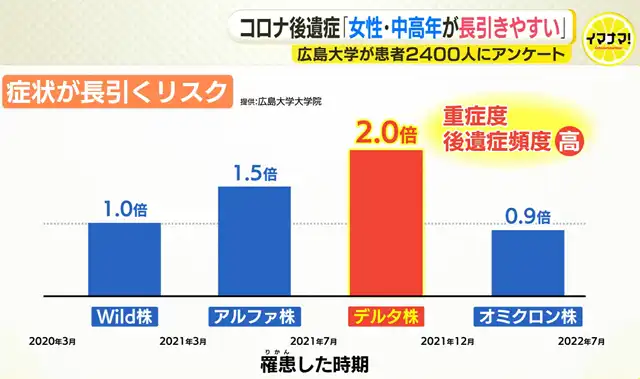Women and Middle-aged More Susceptible to Long COVID
- Normal Liver Cells Found to Promote Cancer Metastasis to the Liver
- Nearly 80% Complete Remission: Breakthrough in ADC Anti-Tumor Treatment
- Vaccination Against Common Diseases May Prevent Dementia!
- New Alzheimer’s Disease (AD) Diagnosis and Staging Criteria
- Breakthrough in Alzheimer’s Disease: New Nasal Spray Halts Cognitive Decline by Targeting Toxic Protein
- Can the Tap Water at the Paris Olympics be Drunk Directly?
Women and Middle-aged More Susceptible to Long COVID, Delta Variant Poses Heightened Risk
- Should China be held legally responsible for the US’s $18 trillion COVID losses?
- CT Radiation Exposure Linked to Blood Cancer in Children and Adolescents
- FDA has mandated a top-level black box warning for all marketed CAR-T therapies
- Can people with high blood pressure eat peanuts?
- What is the difference between dopamine and dobutamine?
- How long can the patient live after heart stent surgery?
Hiroshima University Survey: “Women and Middle-aged People More Likely to Experience Prolonged Symptoms of COVID-19,” “Delta Variant Poses Greater Risk”
Hiroshima University has published the results of a survey of patients regarding the long-term effects of the novel coronavirus. It is believed that symptoms persist longer in women and middle-aged individuals compared to men.
Hiroshima University Graduate School conducted a survey over 2 years and 4 months from March 2020, questioning approximately 2,400 people who had been infected with the novel coronavirus to analyze their symptoms.
COVID-19 has continued to spread as the virus mutates. Recently, it has been said that the risk of severe illness is lower with the Omicron variant compared to previous variants. However, what was the actual situation? We spoke to Lecturer Fumi Sugiyama, who conducted the research.

Hiroshima University Graduate School, Dr. Fumi Sugiyama:
“With the Omicron variant, it’s said that ‘the aftereffects have decreased (symptoms have become milder),’ but the Delta variant was significantly higher. There is no difference in risk between the Alpha, WilD, and Omicron variants. The Delta variant stood out, with a higher frequency of severity and aftereffects.”
During the period when the Delta variant was dominant in 2021, the risk was twice as high as during the early stages of the spread. It was also revealed that about 60% of patients whose symptoms such as fatigue and cough lasted for 3 months did not fully recover even after 1 year.
When looking at patients whose symptoms lasted for more than 3 months by age group, if the number for those aged 12 and under is “1,” the ratio was “6.5 times” for those aged 30 to 49, and “5.5 times” for those aged 50 to 69, showing a higher prevalence among middle-aged and older individuals. In terms of gender, women, who are more likely to have immune responses, were about twice as likely as men. Smokers and diabetes patients also had a higher risk compared to non-smokers and non-diabetics, according to the analysis.
Dr. Fumi Sugiyama, Hiroshima University Graduate School:
“As subtypes of the Omicron variant emerge, it remains to be seen whether symptoms will persist after 2 to 3 years. If a longer-term natural course becomes clear…”
Hiroshima University Graduate School plans to conduct additional surveys of patients by the end of 2024 to further support the management of aftereffects.
Women and Middle-aged More Susceptible to Long COVID, Delta Variant Poses Heightened Risk
(source:internet, reference only)
Disclaimer of medicaltrend.org
Important Note: The information provided is for informational purposes only and should not be considered as medical advice.



